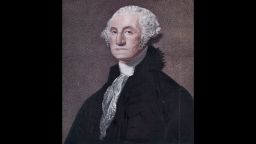Story highlights
Bush is returning to the national stage in the role of an elder statesman
Return comes as Trump's new administration is rocking Washington
Ex-presidents tend to recede from public view, particularly when they leave office – as George W. Bush did – with a Gallup approval rating hovering around 30%.
But Bush is returning to the national stage this week in the role of an elder statesman. He’s promoting his new book “Portraits of Courage: A Commander in Chief’s Tribute to America’s Warriors” in television appearances and spoke before a sold-out crowd Wednesday evening at the Ronald Reagan Presidential Library in Simi Valley, California.
George W. Bush discovers his ‘inner Rembrandt’ in homage to veterans
His return to the political scene comes as President Donald Trump’s new administration is rocking Washington with upheaval and instability.
At the Reagan Library event, Bush made clear he did not want to second-guess the current President and said his comments this week had been misconstrued as criticism.
“I’m asked the question, ‘Do I believe in free press?’ And the answer is, absolutely I believe in free press,” Bush said. “So I answered that question, and of course the headlines were ‘Bush criticizes Trump.’ And so therefore, I needed to say there should be a free and independent press, but it ought to be accurate.”
Nevertheless, Bush’s presence underscores the contrast in tone between the two most recent Republican presidents and serves as a reminder of how the expectations surrounding presidential rhetoric and tone have changed over the years.
Bush “was a president who after 9/11 talked about Islam as a religion of peace,” said Steve Schmidt, a Republican strategist and former Bush aide. “He talked about the act of illegal immigration – people who took great risk coming across the desert – as an act of love for their families.”
“All presidents have been in difficult times and divisive fights, but there was a normalcy of behavior expected of the American head of state rhetorically,” Schmidt said.
He cited the recent example of Trump blaming generals for the loss of Senior Chief Petty Officer William “Ryan” Owens during a covert mission in Yemen. (“They lost Ryan,” Trump said in an interview with Fox News that aired Tuesday).
“That’s not how George W. Bush, or Barack Obama, or Bill Clinton, or George Herbert Walker Bush, or Ronald Reagan talked about the military,” Schmidt said. “He was a president who served in turbulent times and was controversial, but as is always the case – when a president has distance from their presidency, voters look at them and are much more likely to see their virtues than their flaws.”
Trump tempered his tone – at least temporarily – with a strong performance at Tuesday’s joint address to Congress. The emotional high point of his speech came when he spoke directly to Owens’ wife, Carryn, who watched the speech from the first lady’s box.
He also spoke in more measured terms about race and the need for the country to unify even as he maintained hardline positions on issues such as building a wall along the US border with Mexico and repealing and replacing Obamacare.
On the news interview circuit this week, Bush has been peppered with questions about Trump’s controversial actions on immigration and his targeted travel ban (which was halted by the federal courts).
Bush, whose brother Jeb was hazed by Trump during the Republican primaries, never warmed to Trump in the general election. In interviews this week, he has been careful to avoid personal criticism Trump, but made his displeasure clear about both the political climate and some of the President’s policies.
“I don’t like the racism, and I don’t like the name-calling, and I don’t like the people feeling alienated,” Bush told People Magazine. “Nobody likes that.”
Bush offers muted criticism of Trump, talks Russia, travel ban, free press
Bush took issue with Trump’s characterization of the press as the enemy.
“I considered the media to be indispensible to democracy, that we need an independent media to hold people like me to account,” Bush said on NBC’s “Today” earlier this week. “Power can be very addictive, and it can be corrosive, and it’s important for the media to call to account people who abuse their power, whether it be here or elsewhere.”
During an interview with “Sunday Today” host Willie Geist, Bush also seemed to make the case for the so-called “Dreamers,” who were brought to America as young children, to stay in this country.
“I think somebody who has vested time and effort and can make a contribution to our country will be a really good citizen,” the former President told Geist. “See in Texas, we grew up with a lot of people of Hispanic heritage and we’re used to the contributions they have made to our state and to our country.”
At the same time, he acknowledged the political difficulty in finding compromise on changes to the immigration system.
“I tried to reform it and one of my big regrets was that I couldn’t get Congress to respond,” he said. “And I think the plan I laid out ultimately would be the plan that would be accepted.”



